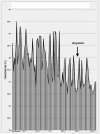Prolonged fever and hyperferritinaemia: a puzzling diagnosis of neonatal herpes simplex virus infection during COVID-19 pandemic
- PMID: 33692072
- PMCID: PMC7949446
- DOI: 10.1136/bcr-2020-241405
Prolonged fever and hyperferritinaemia: a puzzling diagnosis of neonatal herpes simplex virus infection during COVID-19 pandemic
Abstract
Neonatal herpes simplex virus (HSV) infection is rare, with an estimated incidence of 3.58 per 100 000 live births in the UK and should be suspected in any newborn with fever and bacterial culture-negative sepsis. We describe a case of a previously well full-term male neonate who presented with persistent fever and elevated ferritin level that was carried out during the era of the COVID-19 pandemic as part of SARS-CoV-2 panel investigations. Despite the initial negative HSV serology, HSV-1 PCR from a scalp lesion returned positive. He made a full recovery after acyclovir therapy. This case highlights the importance of maintaining a high clinical index of suspicion of HSV infection in any febrile neonate even with absence of maternal history and negative serology, particularly if associated with hyperferritinaemia. We also address the challenge of interpreting inflammatory biomarkers' results for SARS-CoV-2 infection in neonates.
Keywords: COVID-19; infectious diseases; neonatal health; neonatal intensive care; paediatrics.
© BMJ Publishing Group Limited 2021. No commercial re-use. See rights and permissions. Published by BMJ.
Conflict of interest statement
Competing interests: None declared.
Figures
References
-
- British Paediatric Surveillance Unit . BPSU annual report, 2019-2020. London: British Paediatric Surveillance Unit/Royal College of Paediatrics and Child Health, 2020.
Publication types
MeSH terms
Substances
Supplementary concepts
LinkOut - more resources
Full Text Sources
Other Literature Sources
Medical
Miscellaneous

